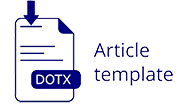THE ROLE OF CORRECTIVE FEEDBACK ON ACADEMIC WRITING PERFORMANCE: EFL STUDENTS’ PERCEPTIONS
Abstract
In the context of higher education, corrective feedback plays a crucial part in academic writing. This paper, therefore, aims to explore the role of corrective feedback on the academic writing performance of EFL students at State Islamic Institute of Kudus. The study employed a qualitative research. In order to gather data, the writer interviewed the students about the perception of the use corrective feedback in enhancing their performance in academic writing. In addition, observation and documentation were conducted to get detail information. The result showed that corrective feedback including the aspects of providing and receiving feedback has led to better improvement in students’ academic writing performance. Indeed, they become more confident in performing their academic writing task. Further, through corrective feedback, students are highly pursued to give more comments regarding the performance of their peers in academic writing. In addition, lecturers merely give clarifications towards the corrective feedbacks in academic writing class by provoking question and answer to promote the students’ critical thinking skills.
Keywords
Full Text:
PDFReferences
Algiraigri, A. H. (2014). Ten tips for receiving feedback effectively in clinical practice. Medical Education Online, 19, 25141. https://doi.org/10.3402/meo.v19.25141
Banaruee, H., Khatin-Zadeh, O., & Ruegg, R. (2018). Recasts vs. direct corrective feedback on writing performance of high school EFL learners. Cogent Education, 5(1), 1–23. https://doi.org/10.1080/2331186X.2018.1455333
Bostanci, H. B., & Çavuşoğlu, Ç. (2018). Pen-and-paper or online? An academic writing course to teacher-trainees. Cogent Education, 5(1), 1–15. https://doi.org/10.1080/2331186X.2018.1482606
Cushing, A., Abbott, S., Lothian, D., Hall, A., & Westwood, O. M. R. (2011). Peer feedback as an aid to learning - What do we want? Feedback. When do we want it? Now! Medical Teacher, 33(2). https://doi.org/10.3109/0142159X.2011.542522
Gay, L. R., Mills, G. E., & Airasian, P. W. (2012). Educational Research Competencies for Analysis and Applications Tenth Editions. Boston: Pearson Prentice Hall.
Haffling, A. C., Beckman, A., & Edgren, G. (2011). Structured feedback to undergraduate medical students: 3 years’ experience of an assessment tool. Medical Teacher, 33(7). https://doi.org/10.3109/0142159X.2011.577466
Huisman, B., Saab, N., van Driel, J., & van den Broek, P. (2018). Peer feedback on academic writing: undergraduate students’ peer feedback role, peer feedback perceptions and essay performance. Assessment and Evaluation in Higher Education, 43(6), 955–968. https://doi.org/10.1080/02602938.2018.1424318
Marbouti, F., Mendoza-Garcia, J., Diefes-Dux, H. A., & Cardella, M. E. (2019). Written feedback provided by first-year engineering students, undergraduate teaching assistants, and educators on design project work. European Journal of Engineering Education, 44(1–2), 179–195. https://doi.org/10.1080/03043797.2017.1340931
Noroozi, O., & Hatami, J. (2018). The effects of online peer feedback and epistemic beliefs on students’ argumentation-based learning. Innovations in Education and Teaching International, 3297, 1–10. https://doi.org/10.1080/14703297.2018.1431143
Tasdemir, M. S., & Arslan, F. Y. (2018). Feedback preferences of EFL learners with respect to their learning styles. Cogent Education, 5(1), 1–17. https://doi.org/10.1080/2331186X.2018.1481560
van Kraayenoord, C. E., Miller, R., Moni, K. B., & Jobling, A. (2009). Teaching writing to students with learning difficulties in inclusive English classrooms: Lessons from an exemplary teacher. English Teaching, 8(1), 23–51.
Wahyuningsih, S. (2018a). Challenges and Opportunities of Teaching Academic Writing Skills: A Case Study of Students at IAIN Kudus. Edulingua, 5(1), 15–24.
Wahyuningsih, S. (2018b). Empowering Academic Writing Skills in Millennial Era: The Role of English Program for Bidikmisi Students. In The 2nd National TELCECON (Teaching, Linguistics, Culture, and Education Conference) “Pendidikan di Era 4.0 (pp. 108–114). Universitas Muria Kudus.
Zhai, K., & Gao, X. (2018). Effects of corrective feedback on EFL speaking task complexity in China’s university classroom. Cogent Education, 5(1), 1–13. https://doi.org/10.1080/2331186X.2018.1485472
DOI: https://doi.org/10.34001/edulingua.v7i1.1167
Article Metrics
Refbacks
- There are currently no refbacks.

Ciptaan disebarluaskan di bawah Lisensi Creative Commons Atribusi 4.0 Internasional.











